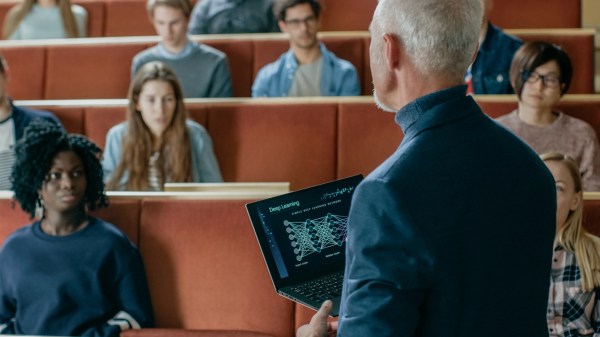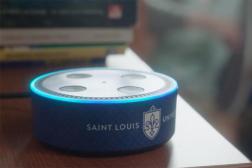Northeastern U. to equip all students with Alexa-powered devices
Beyond the voices of roommates just a few feet away and fellow classmates down the hall, students at Northeastern University are growing accustomed to hearing the sound of Alexa in their college dormitories.
After what university officials deemed a “hugely successful” pilot involving about 60 students during the 2017-18 school year, Northeastern is expanding its Echo Dot program this fall and eventually plans to deploy the Alexa platform to all 18,000 of its students. The private research university in Boston joins institutions like Arizona State and Georgia Tech as one of the early adopters of the technology.
“We’re always looking for technology that engages our students, that helps the student experience,” said Madeleine Estabrook, vice president for student affairs at Northeastern.
The virtual assistant, developed by Amazon and introduced in 2014, quickly became a staple in American homes, making it easier for families to dim the lights, change the temperature, play music or check the weather. But not long after the voice-command technology took off in homes, it began to earn attention in another market , said Brooke Gleason, a senior business development manager at Amazon Web Services (AWS) who focuses on education.
“One of the interesting places we saw an explosion of interest in Alexa and voice skills was in higher education,” Gleason said at a recent AWS event in Washington, D.C.
Husky Helper
This spring, 64 Northeastern students received Echo Dots equipped with a special Alexa skill called “Husky Helper,” named after the university mascot.
Husky Helper was developed by a technology company called n-Powered . The team at n-Powered created APIs for dozens of frequently used higher ed systems — Banner, Salesforce, financial aid systems like PeopleSoft, learning management systems like Blackboard and Canvas, and universities’ homegrown systems, among others, according to Somen Saha, co-founder of n-Powered.
With Northeastern, they then brought the data gleaned from those systems through Amazon’s API gateway and put it in an AWS data lake.
“You can put it in one place and actually see the entire picture of a student — not just a partial view,” Saha said. “We create a 360-degree view for ourselves.”
For the pilot, n-Powered employees programmed the Echo Dots manually — a mistake they said they won’t be making again. For the device rollout this fall, they’ll use Alexa for Business, which “makes it easy to manage and enroll the devices,” Joel Evans, the other co-founder of n-Powered, said. Alexa for Business also allows specially made Alexa skills — which are uniquely developed voice applications — to be distributed privately, which appealed to officials at Northeastern.
The Husky Helper skill is programmed to answer a few dozen of students’ most commonly asked questions and demands, from simple tasks like “Set an alarm for 30 minutes before my first class tomorrow morning” and “What events are happening this week?” to “Why is there a hold on my account?” and “How much money is left on my meal plan?”
Northeastern staff said they were blown away by how quickly students embraced the voice-assisted devices.
“The magic of the whole thing … is it’s instantly accessible,” Estabrook said. “They don’t have to wait in lines or stay on the phone on hold. They can find exactly what they need for their personal problem at that moment and continue what they’re doing.”
This virtual assistant initiative is about meeting the students where they are, Estabrook said. The students have grown up expecting things to be efficient, simple and seamless, and the devices help Northeastern get one step closer to offering that kind of experience while also “prepar[ing] our learners to be the agile, adaptable, creative problems solvers required to build sustainable human communities in the 21st century,” she said.
A voice at a vulnerable time
Estabrook thinks Alexa could contribute to higher retention and graduation rates — a metric that Northeastern, like all colleges and universities, is constantly looking to improve.
“We know that what works is making sure that our students feel they belong,” she said. “The more we can engage them where they are, the better experience they have. That’s exactly what this does.”
It also “reduces their cognitive load,” Estabrook said. “They can go back to learning. This allows them to open up the space and do those things in learning that are so uniquely human.”
Erin Smith, the assistant vice president for online experiential learning at Northeastern, said she hears often about how isolating and lonely college can be for students but has seen already that the voice technology helps reverse some of that.
“It’s striking to me how much the anxieties of navigating the complex university system is reduced a great deal,” Smith said. “That can free them up to really focus on why they’re here in the first place.”
Students, of course, can opt not to take an Echo Dot, officials said. Those who do, however, can specify which accounts they want Alexa to have access to. Some students, for example, may not want Alexa connected to their financial aid information and can decline to provide that.
Saha said n-Powered is working on ways to enhance privacy features for students using Alexa. An obvious issue is how to handle students who have the Echo Dot and live with roommates. For now, Alexa is unable to distinguish between different voices. One way n-Powered is addressing that is by creating a unique four-digit code that students must provide in order to access personally identifiable information, such as a Social Security number or their bank account information.
Right now — and until a solution is established — that information cannot be accessed via Alexa.
As Northeastern prepares to expand its Echo Dot program this fall, n-Powered is working with another “large university” to deploy several thousand devices to students, Saha said. He declined to name the institution.
Meanwhile, officials at Northeastern will continue to explore the role of voice-activated technology on campus, including whether it has a place in faculty offices, lecture halls or research labs, Smith said.




